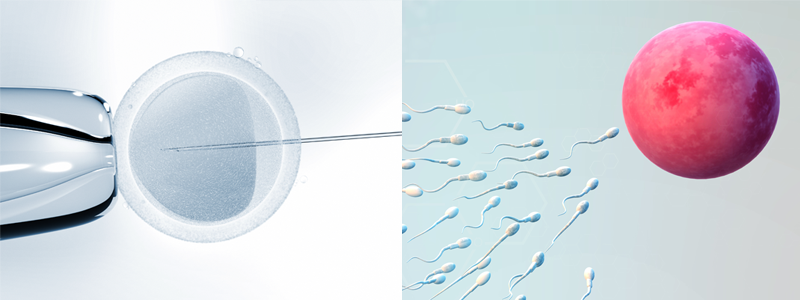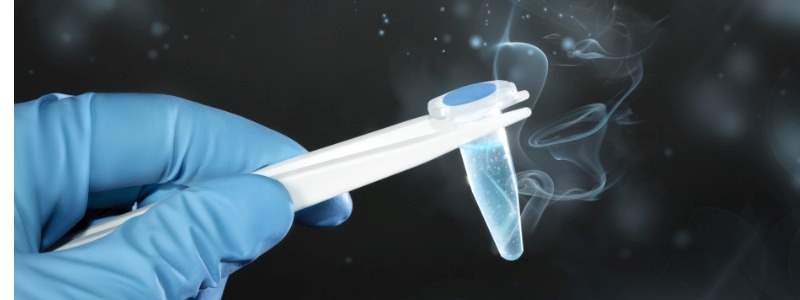An estimated 1.5 million women in the UK (1 in 10 of reproductive age) suffer from endometriosis, a potentially debilitating condition that can also affect the ability to conceive. All women have different levels of AMH (anti-mullerian hormone): a hormone found in the blood that is given off by developing eggs in the ovary.
In this blog, we’ll be looking into the connection between AMH and endometriosis, and the different fertility treatments available to women.
What causes endometriosis and what are the symptoms?
Endometriosis is a common, long-term gynaecological condition where the tissue that lines the womb is found outside this area. This could be in the fallopian tubes or ovaries, though it has been found in the colon, bladder, liver, brain and lung. Despite its prevalence, the causes of endometriosis are currently unknown. It could be a result of a genetic predisposition, retrograde menstruation, lymphatic or circulatory spread, immune dysfunction, metaplasia or environmental factors.
Symptoms vary from woman to woman but can include chronic pain, particularly in the lower back or tummy, pain during or after sex, and sickness, diarrhoea or blood in the urine during menstruation. If you are suffering from the above symptoms you should contact your GP.
Find out more about endometriosis on the NHS website.
Treatments for endometriosis
There is currently no cure for endometriosis, though there are a number of treatments available that can relieve symptoms. Endometriosis is sometimes treated with surgery, such as a laparoscopy, also known as keyhole or minimally invasive surgery, or by painkillers or hormone treatment.
It is important you understand any potential negative effects these treatments can have on fertility before commencing them. It is also important to note that medical (drug) treatment for endometriosis does not improve fertility, though surgical intervention can improve your chances of getting pregnant, particularly for those with mild or moderate endometriosis.
How does endometriosis affect fertility?
Endometriosis is characterised by the inability for menstrual blood to exit the body. This can lead to inflammation and a build-up of scar tissue which may damage the fallopian tubes or ovaries, block the fallopian tubes or prevent sperm from entering. These issues can cause difficulty in getting pregnant or may result in not being able to get pregnant at all.
There are a number of factors that can influence the ability of women with endometriosis to conceive. These include whether the condition is considered to be mild, moderate or severe, the woman’s age and other fertility issues such as damage to the reproductive organs or sperm-related problems. The current official advice from the NHS is that women with mild or moderate endometriosis should eventually be able to get pregnant without treatment. It is important to note, however, that even women with severe endometriosis can still get pregnant.
AMH levels and endometriosis: Will it affect my fertility?
One of the most pertinent questions for endometriosis sufferers concerned about their chance of conception is whether endometriosis lowers, or causes low AMH levels. Studies have revealed correlations between women with low AMH levels and endometriosis, but more research is needed.
Testing AMH levels
An AMH test is a marker for ovarian (egg) reserve and is assessed via an AMH blood test. The test can be done at any time during the menstrual cycle and should be combined with an antral follicle count (AFC), which is the number of small follicles within both ovaries, for greatest accuracy. AFC is done using an expert fertility ultrasound scan.
‘If you’re having trouble conceiving or simply want to be more informed, an AMH test is definitely worth considering” says CREATE Fertility Medical Director, Professor Geeta Nargund,“ If you have a family history of early menopause or you suffer from an underactive thyroid, an early AMH test could help to reassure you that your egg reserve is not adversely affected.’
Find out more about AMH blood test here.
Can IVF be successful with endometriosis?
If you suffer from endometriosis and are experiencing difficulties conceiving or want to understand your options, it is important to speak to your GP first.
If a woman’s infertility is caused by endometriosis, rates of pregnancy are significantly improved with IVF treatment. We’d recommend getting in contact or booking a consultation with the friendly team at CREATE Fertility to discuss your options.
What fertility treatments are available and do they affect endometriosis?
Exactly which treatment is right for you depends on a variety of factors such as your egg reserve, age and how long you have been trying to conceive. The level of endometriosis is also a significant factor. Here at CREATE Fertility, we offer tailor-made treatment protocols depending on your specific needs and circumstance.
It’s important that each patient is aware that taking fertility drugs may sometimes exacerbate endometriosis as the hormones can cause the lining of the womb to develop more quickly. Our Natural and Mild treatments are good options to consider for endometriosis as use fewer fertility drugs to achieve a mild response. These treatments are also beneficial as they have no-down-regulation, a short treatment duration, lower side effects and are safer for the mother and child. See the success rates here. Your doctors will be able to advise you on the best course of action at your initial consultation.
Concerned about your AMH levels or endometriosis? Get in touch today for a consultation with our specialists.







